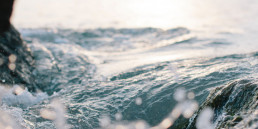During the Digital Sea Conference which was organized this summer in Klaipėda, the panel that focused on the challenges and benefits of sustainable aquaculture was initiated by the EIT Food (part of European Institute of Innovation and Technology), the European leading food innovation initiative working to make the food system more sustainable, healthy and trusted. For the EIT Food sustainable aquaculture is one of its key focus areas, therefore they aim to contribute to the implementation of the the European Green Deal by aligning with the European Farm to Fork strategy and achieving several of the UN’s Sustainable Development Goals by 2030.
Technologies will increase the sustainability of aquaculture
The panel was started by the speech by Jouni Vielma, the lead researcher at the Finnish Institute of Natural Resources (Luke), who emphasized the importance of technology that will open up opportunities to increase the sustainability of aquaculture. He pointed out that digital solutions are important in all value chains from manufacturing or processing to retail. According to the researcher, who provided a number of real examples during the conference, the importance of large global technology companies in the food sector is growing. Mr. Vielma agreed that the salmon industry is the engine of aquaculture technology, but at the same time, the need for solutions that would encourage the development of innovations in other areas of aquaculture was emphasized.
Hanne Mertens, Chief Operating Officer at Aqua Pharma Group, agreed with Jouni Vielma’s idea that the salmon industry has changed and become more sustainable and advanced. However, in her opinion, there are still many challenges in this area. According to Hanne Mertens, innovators should focus on how to prevent the disease spreading among the fish and apply sustainable and effective treatment when diseases occur.
The importance of aquaculture products is growing
According to Mercedes Groba, Innovation Programme Manager at “EIT Food“, seafood supply in Europe is limited and demand is growing, making the Old Continent dependent on imports. International expert who moderated the discussion highlighted that “EIT Food” strives to contribute to sustainable aquaculture through innovation, education, business creation and
communication.
Surprising statistics were presented. Around half of the fish consumed in the human food chain today is grown on fish farms, and this figure is expected to reach 75 % in the next five years. According to experts, the more fish for human consumption is farmed, the greater is the risk of disease spreading among the fish. If left untreated, this might have a significant impact on the health and grow of the fish.
This fact cannot be ignored because, according Niki Alexi, a postdoc at the University of Aarhus, the importance of aquaculture in the food sector is growing. This can be seen not only in changing trends, but also in survey data. According to the recent consumer research conducted in 2020, approximately 30% of Europeans indicated that they want to increase their consumption of fish and seafood in the future. According to the researcher, these are clear real challenges that need to be addressed. It is also necessary to find sustainable ways to reduce the challenges of transporting products and extend the shelf life of fish fillets. However, this should not affect the sensory characteristics (such as appearance, taste/flavor, and texture) of the product. According to the researcher, the amount of production that becomes waste must be reduced, because today even a
third of aquaculture products remain unused.
Cooperation is needed
During the discussion, there was no doubt that the research needed to drive progress needs more attention from all stakeholders. However, Paul Sindilariu, co-founder of the Next Tuna GmbH, emphasized that it is not the speed of research and innovation that is a barrier to progress. The biggest challenges, according to the expert, are legal and administrative barriers that
slow down the development of innovation, because at the research level, everything is going great. Unless there is a small mismatch between science and business, as sometimes researchers move too far away from the daily routine on farms.
Another aspect was highlighted by Mark Chryssolouris, CEO at SuSea. According to him, global resources are declining and aquaculture is the only way to ensure sustainable food security. However, in order for this to happen, the cooperation of all stakeholders is essential. The entrepreneur emphasized the need to educate consumers. They should not rely solely on information on social media, as it can often be misleading. According to Chryssolouris, food education in crucial in order for consumers to be able to choose healthier and more sustainable food.


